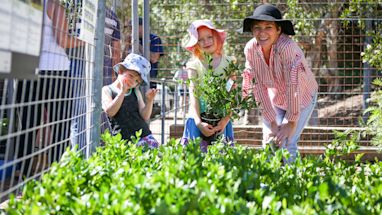As summer temperatures around the world continue to spike, it's smart to prepare for heat, storms and knock-on scenarios. Are you ready?
There are lots of things we can do to help ourselves, our families, friends, neighbours and even pets beat the heat and keep cool, including getting organised ahead of a heatwave.
Ask yourself these questions to be prepared for summer.

Do you follow the best weather resources?
The Bureau of Meteorology has 4 day heatwave warnings which can help you plan for heat well in advance. You can also watch how to understand their heatwave warnings.
Knowing weather information and emergency warnings can help you avoid higher daytime heat and check on family or neighbours who might have medical conditions,” City of Sydney sustainability and heat expert Zoe Morrison said.
We also recommend following:
- Ausgrid - for power supply and service updates for your area
- Sydney Water – for water supply and service updates for your area
- ABC 702 - for live radio updates and forecasts
- HeatWatch - for personalised heat risk monitoring
You can also download the Bureau of Metereology app which has a heatwave warning feature.
Do you know the symptoms of heatstroke?
Heat stroke is a life-threatening condition where your body overheats. Knowing the signs and symptoms can help you identify when you, a family member or neighbour may need urgent medical attention.
Symptoms such as confusion, rapid pulse, and hot, dry skin can signal that the body is struggling to cope with intense heat.
NSW Health says to look out for these symptoms:
- confusion
- slurred speech
- agitation and altered mental state
- loss of consciousness
- profuse sweating or hot, dry skin
- muscle twitching or seizures
- rapid breathing
- a quick and strong pulse
- very high body temperature
Read more about NSW Health’s guide to heat-stroke and other ways to prepare for heat.

Do you have an emergency plan and kit?
Heatwaves put a lot of strain on power as more homes and businesses crank up their air conditioners. This can overwhelm city power grids and there’s even a possibility of extended power outages – in summer 2023, 300,000 Austin, Texas residents lost power as temperatures soared above 45 degrees Celsius.
It's a good idea to get your kit ready now to keep you going in a blackout, or if you lose water supply.
- Eskies and ice for storing medication and food
- Torches or head lamp with working batteries
- Candles and matches
- Battery operated radio
- Car phone charger
- List of important phone numbers in case your phone battery dies
- First aid kit
- Containers of water – allow 3 litres a person a day and have at least a 3 day supply
- Non-perishable food - enough for 3 days
- Buckets for leaks and for collecting water if your water supply gets cut off
Tip: You might like to prepare and give emergency kits to friends and family.
We also recommend downloading the Australian Red Cross Get Prepared App. It's an easy-to-use platform that takes you through the steps of making a personal emergency RediPlan.
Medication tip
Dr Amy Dennis is a GP at Paddington Family Practice and says:
If you take medications or have an illness like diabetes, it’s a great idea to talk to your GP about how to best prepare for hot weather and heatwaves. They can help you come up with a plan based on your individual medical needs. If you take medicine, ask your pharmacist about what temperature it should be stored at and have a plan if a blackout may affect its safe storage. Also plan to check on family members, neighbours or the elderly who may be vulnerable during a heatwave.
She added that those who might suffer from mental health issues can also plan ahead.
As most people opt to stay indoors in the event of a heatwave, people with mental health issues may lose the ability to stay physically connected to their support network. Make a plan to stay connected with others, your GP, psychologist or visit resources like Beyond Blue or The Black Dog.
Do you know where to find free wifi Telstra payphones?
If you run out of phone battery or lose internet access, you can make free calls and use the internet at selected Telstra pay phones. Find your nearest payphone.
You might like to check in on friends or family, or let them know you're ok.

Do you have a plan for your pets?
Potts Point Veterinary Hospital states it’s good to know if your dog breed falls into a higher risk of overheating.
Heatstroke is a life-threatening emergency which results from thermal injury to multiple organ systems. Common circumstances surrounding heatstroke include being enclosed in a confined space such as a vehicle, garage or attic, over-exercising or being over-exposed to the sun.
Dog breeds that are at high risk of over-heating:
- Pug
- Pekinese
- Bulldog
- Shit-Tzu
- Boston terrier
- French bulldog
- Boxer
- Cavalier King Charles Spaniel
Other things to plan for include changing the time of day you walk them to avoid painful burns on your dog’s paw pads from hot footpaths. You could also stick to grass only for their walks and runs.
Grooming is also particularly important in the summer - if they have a thick hair coat consider a "summer clip." Just ensure the hair isn't cut too short as this can lead to sunburn!

Have you prepared your home?
Summer brings severe storms. The SES has simple ways to help you prepare your home to prevent it becoming damaged in a severe storm, especially if you're away on holidays. It also has apartment specific storm-safe plans. They say to:
- maintain your yard and balcony
- clean your gutters, downpipes and drains
- trim trees and branches
- keep your roof in good condition
- check your insurance policy
- make an emergency plan
- listen to your local radio station for weather warnings.
If you notice a risk of flooding from clogged drains or infrastructure in your area, you can call the City of Sydney and report it. We’re here to help get our area prepared and stay safe during summer, Sustainability expert, City of Sydney Zoe Williamson said.
As the forecasts look to hotter days ahead, it's smart to be proactive, informed, and connected. Summer is more than just fun in the sun: it's a season to prepare for.
If you need mental health support, there are services that can help. You can speak with your doctor to be connected to a service or contact:
- Lifeline (13 11 14)
- 13 Yarn (13 92 76) for Aboriginal and Torres Strait Islander peoples
- If you are experiencing an emergency, call 000
Published 7 December 2023, updated 17 October 2025



